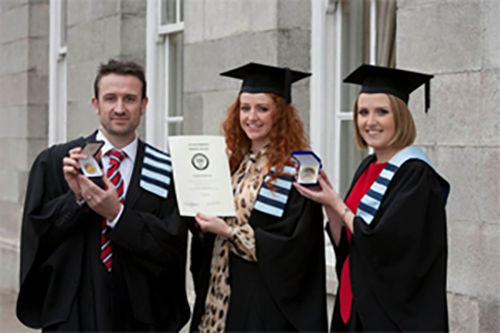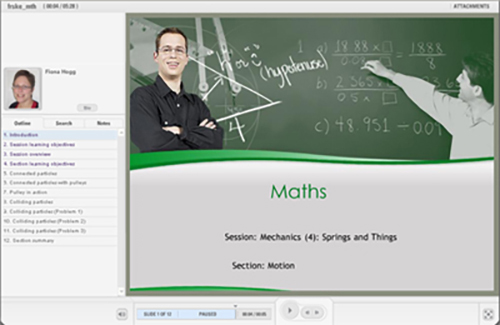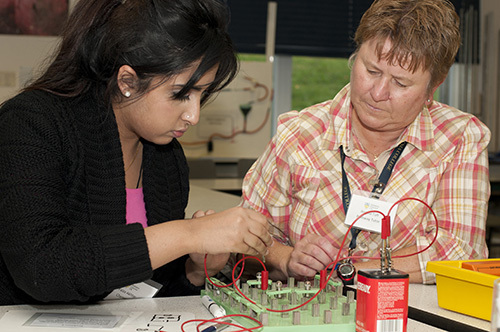
博士. Nicholas Breakwell 在愛爾蘭的 Hibernia College 及其在英國的子公司工作了近十年 (後者最近被 TES Global 收購,Breakwell 為其提供諮詢服務). During that time he had overall responsibility for teaching, learning strategy and e-learning infrastructure. Breakwell’s responsibilities included the development of digital learning tools that now power all Hibernia College online programs. The College is the largest provider of newly qualified teachers in Ireland. Hibernia’s groundbreaking approach to high quality ITT (initial teacher training) is setting a high bar for other e-learning organizations. What started as a highly protested transition, with fears that online teachers wouldn’t be properly trained, is becoming a global phenomenon. As schools adjust to these shifts, I talked to Breakwell about the future of e-learning and the challenges and opportunities that lie ahead. From digital badges on top e-learning platforms to live inner-ear headphone coaching for teachers, Breakwell gave me the scoop on what’s to come.

What progress has been made in providing support and resources for training teachers via the Internet that had previously been inaccessible?
Teachers can now access an overwhelming volume of resources via the internet. 今天, the challenge is not access to content but identifying those resources which can add value in the classroom. The entire continuum of teacher education from pre initial teacher training through teacher qualification, CPD, master’s level study and even professional doctorates and PhDs can now be accessed via the internet.
High quality ITT (initial teacher training) can be delivered online, a fact which has been externally validated by the Teaching Council of Ireland and by OFSTED in England. 雖然培訓顯然仍然需要進入學校, today no aspiring teacher should be denied entry to the profession as a result of being unable to access an ITT provider. Schools can now “grow their own” teachers by mentoring and supporting local trainees who go on to work in the school post qualification.
But it is not just full award bearing programmes which can now be accessed online. 例如, Times Education Services TES Resources offers teachers the opportunity to download community loaded lesson plans, schemes of work, assessments and other resources at the touch of a button. 最近, TES has introduced a marketplace to enable teachers to sell high quality resources to one another.

How do you see the opportunity for technology to deliver progressive learning and development for teachers and complete the challenge of professionalizing teachers?
Despite the many resources available online, most teachers’ learning and development still takes place in-school in traditional face to face settings. In England most teachers access 5 或 6 in-service training days per annum, 70-90% of which is delivered by school colleagues. Typically these training days cover whole school topics, school policy and deciphering the latest department of education directives. 換句話說, there is little time available for personalised professional development leading to professional progression and improved pupil outcomes.
The impact of University led provision is hardly inspiring either – in England only around 5% of the teaching workforce is engaged in post-graduate or master’s provision despite literally hundreds of available programmes including 72 Masters of Education awards.
然而,, significant personal professional development can and does take place in schools through the professional practice of planning, teaching and evaluation. What is missing, and what technology can provide, is a framework to recognise these professional achievements and skills and a system to create personalised development pathways that are practice relevant and create maximum impact in the classroom. Since time intensive, costly and often less than relevant masters programmes have failed to support the teaching profession, what is now needed is a system of micro awards which recognise and develop real improvement in practice and outcomes.
One technology that could provide this solution is Open Digital Badges (ODBs). ODBs is a Mozilla created standard for designing and issuing micro-credentials which can be displayed in the form of a digital image (badge) across any digital network. Badges could be created for achievements as small as a lesson plan through to a large-scale strategic implementations in a school. Because they are open, badges can be created and issued by anyone. Schools could create their own workforce development strategy underpinned by a badge system where each teacher sets out on a badge acquisition pathway for the benefit of themselves, but more importantly, the pupils and the wider school community. Schools can define and publish their workforce development activities in terms of badges issued and teachers can clearly identify their own achievements and publish these for all stakeholders to see.
Some early examples of badged CPD for teachers already exist. The national professional association for technology in education (NAACE) has launched three CPD badges around the new computing curriculum. In Finland a partnership between a regional education authority and two technical Universities has developed and launched 50 small social media related badges, using Open Badge Factory, for secondary school teachers.

How do you imagine the role of the teacher 5, 10, 和 20 從現在起十年?
It takes time for technology to impact the professional practice of teachers. There remains a professional zeitgeist to challenge change until proven effective which perhaps is very valid given that a recent OECD report finds that investing heavily in school computers and classroom technology does not improve pupils’ 性能. The OECD’s education director, 安德烈亞斯·施萊歇, said school technology has raised “too many false hopes”.
But technology is not going away. Schools and teachers must prepare pupils for a world of work which is dominated by technology and for jobs not yet in existence which will rely on technology. As learning technology becomes commonplace in schools, at home and in work, we will see a gradual shift in the role of the teacher from educator to coach. The teacher’s day to day role will become that of coaching pupils in how to learn as opposed to telling them what to learn.
To facilitate this transition, technology will reduce or eliminate repetitive teaching tasks (and of course admin) resulting in the flipped classroom as the norm. In-ear coaching from federation based expert coaches will roll-out best practice everywhere. Effective online interactive live teaching platforms will enable expert super-teachers to deliver classes across a school federation, addressing the shortage in qualified teachers in shortage subjects. Adaptive learning platforms will facilitate personalised student pathways enabling teachers to offer a truly differentiated learning experience for the first time. Micro recognition systems will support learning and assessment outside of the classroom for both pupils and teachers.
Based on the success of e-learning sites such as Hibernia, do you expect to see an acceleration in online education?
毫無疑問, online education will continue to flourish for 3 主要原因:
- The access, 規模, cost and peer-community USPs of online education versus traditional face to face education are simply unassailable.
- International research supporting the effectiveness of online education has become more robust to the extent that the data now strongly support the conclusion that blended learning produces better outcomes than other modes of learning. To continue teaching without leveraging the benefits of online education will ultimately negatively impact learner outcomes.
- We have moved past the early adopter stage. When Hibernia launched blended ITT in Ireland in 2003, opposing ITT providers mobilised their students to march on the Department of Education to protest against teaching teachers online, describing online education as “yellow pack” (poor quality). 在 2015, every ITT provider in Ireland delivers at least some of its provision online.

(所有照片都是禮貌博士. 尼古拉斯Breakwell)
和我一樣,全球知名的思想領袖,包括邁克爾·巴伯爵士 (英國), 博士. 邁克爾座 (美國), 博士. 萊昂特司特因 (美國), 克萊克里斯坦森教授 (美國), 博士. 琳達·達林 - 哈蒙德 (美國), 博士. MadhavChavan (印度), 邁克爾·富蘭教授 (加拿大), 霍華德·加德納教授 (美國), 安迪·哈格里夫斯教授 (美國), 伊馮娜赫爾曼教授 (荷蘭), 克里斯汀Helstad教授 (挪威), 讓·亨德里克森 (美國), 玫瑰Hipkins教授 (新西蘭), 科妮莉亞Hoogland教授 (加拿大), 這位傑夫·約翰遜 (加拿大), 太太. 尚塔爾考夫曼 (比利時), 博士. EijaKauppinen (芬蘭), 國務秘書TapioKosunen (芬蘭), 多米尼克·拉方丹教授 (比利時), 休·勞德教授 (英國), 主肯麥克唐納 (英國), 傑夫大師教授 (澳大利亞), 巴里McGaw教授 (澳大利亞), 希夫納達爾 (印度), Ř教授. 納塔拉詹 (印度), 博士. 吳PAK (新加坡), 博士. 丹尼斯教皇 (美國), 斯瑞達拉賈戈帕蘭 (印度), 博士. 黛安·拉維奇 (美國), 理查德·威爾遜·賴利 (美國), 肯·羅賓遜爵士 (英國), 帕西SAHLBERG教授 (芬蘭), 押尾佐藤教授 (日本), 安德烈亞斯·施萊歇 (PISA, 經合組織), 博士. 安東尼·塞爾頓 (英國), 博士. 大衛·謝弗 (美國), 博士. 基爾斯滕都沉浸式 (挪威), 總理斯蒂芬·SPAHN (美國), 伊夫Theze (LyceeFrancais美國), 查爾斯Ungerleider教授 (加拿大), 托尼·瓦格納教授 (美國), 大衛·沃森爵士 (英國), 迪倫Wiliam教授 (英國), 博士. 馬克沃莫爾德 (英國), 西奧Wubbels教授 (荷蘭), 邁克爾·楊教授 (英國), 和張民選教授 (中國) 因為他們探索所有國家今天面臨的大畫面的教育問題.
全球搜索教育社區頁面
ç. M. 魯賓是兩個廣為傳誦的在線系列,她接受了筆者 2011 厄普頓·辛克萊獎, “全球搜索教育” 和 “我們將如何閱讀?” 她也是三本暢銷書, 其中 真正的愛麗絲夢遊仙境, 是的發行 CMRubinWorld, 而且是干擾物基金會研究員.
按照ç. M. 魯賓在Twitter: www.twitter.com/@cmrubinworld






最新評論